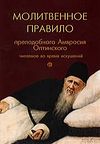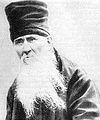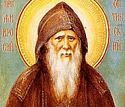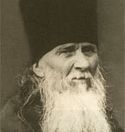

| Previous day | Next day |
| Old Style
June 27
|
Saturday |
New Style
July 10
|
|
3rd Week after Pentecost.
Tone 1.
Fast of the Holy Apostles. |
Fish, wine and oil allowed.
|
![]() St. Joanna the Myrrh-bearer (1st c.).
St. Joanna the Myrrh-bearer (1st c.). ![]() St. Sampson the Hospitable, of Constantinople (ca. 530). Uncovering of the relics of Optina Elders Leonid, Macarius, Hilarion, Ambrose, Anatole I, Barsanuphius, and Anatole II (1998).
St. Sampson the Hospitable, of Constantinople (ca. 530). Uncovering of the relics of Optina Elders Leonid, Macarius, Hilarion, Ambrose, Anatole I, Barsanuphius, and Anatole II (1998).
St. Severus, priest, of Interocrea in Italy (6th c.). St. George of the Holy Mountain and Georgia (1065). Blessed Martin of Turov (after 1146). St. Serapion of Kozhaezersk Monastery (1611).
New Hieromartyr Gregory Nikolsky, priest, of Kuban (1918). New Hieromartyr Kirion II, catholicos-patriarch of Georgia (1918).
Hieromartyrs Crescens, Maximus, and Theonest, bishops of Mainz (Germany) (early 5th c.). Martyr Anectus of Caesarea in Cappadocia (304). Martyrdom of Monk Luke (Mukhaidze) of Holy Cross Monastery in Jerusalem (1277). Hieromartyr Pierius, priest, of Antioch.
Thoughts for Each Day of the Year
According to the Daily Church Readings from the Word of God
By St. Theophan the Recluse

Saturday. [Rom. 3:28-4:3; Matt. 7:24-8:4]
The present Gospel reading says that one who hears the sayings of the Lord and does them is like one who builds a house upon a rock; but one who hears them and does not do them is like one who builds a house upon the sand. Everyone should learn this by heart and repeat it often; the truth contained in it is graphically clear and anyone can understand it. Everyone has had many experiences of this. Take your thoughts, for example. While you are thinking about something, they are unstable and restless, but when you write them down, they become solid and fixed. The outcome of any project is unsure and its details can change many times before it is begun; yet any further cogitation ceases once you have set it in motion. In this manner, moral rules are alien to us when not fulfilled, they are outside of us and shaky. But when we fulfil them, they enter within, settle in the heart and form the basis of our character—good or evil. See then that ye walk circumspectly, not as fools, but as wise (Eph. 5:15).
Articles
 St Joanna the Myrrhbearer |
 St Sampson the Hospitable of Constantinople |
 St Severus the Presbyter of Interocrea in Italy |
 Venerable George of Mt. Athos, Georgian |
 Venerable Martin of Turov |
 Venerable Serapion of Kozhe Lake |
















